The Official Publication of the Tennessee Turfgrass Association, the Tennessee Valley Sports Field Management Association and the Tennessee Golf Course Superintendents Association
Highlights from the 58 th ANNUAL TTA CONFERENCE

THE NATIONAL CHAMPION TREE PROGRAM
An honor for Tennessee, a boon for the Nation
SPOTTED LANTERNFLIES
Detected in Middle Tennessee
FEBRUARY / MARCH 2024
PLUS
Saving America’s Water

In just 7 years, over 1.5 billion square feet of TifTuf has been installed on residential and commercial landscapes, golf courses, and collegiate and professional sports fields across our country. As a result, over 46.5 billion gallons of our precious water resources have already been saved . TifTuf has absolutely changed the face of the American landscape!

www.THETURFGRASSGROUP.com

Ryan.Swilling@RegalChem.com
Sam
Sam.Womack@RegalChem.com
RegalCrown TM Find out what Regal can do for you. Contact a member of your Tennessee team today.
Carter | 901.412.3932
Galbreth | 931.212.8909
Swilling | 423.503.5542
Phillip
Phillip.Carter@RegalChem.com Joe
Joe.Galbreth@RegalChem.com Ryan
Womack | 404.374.1206
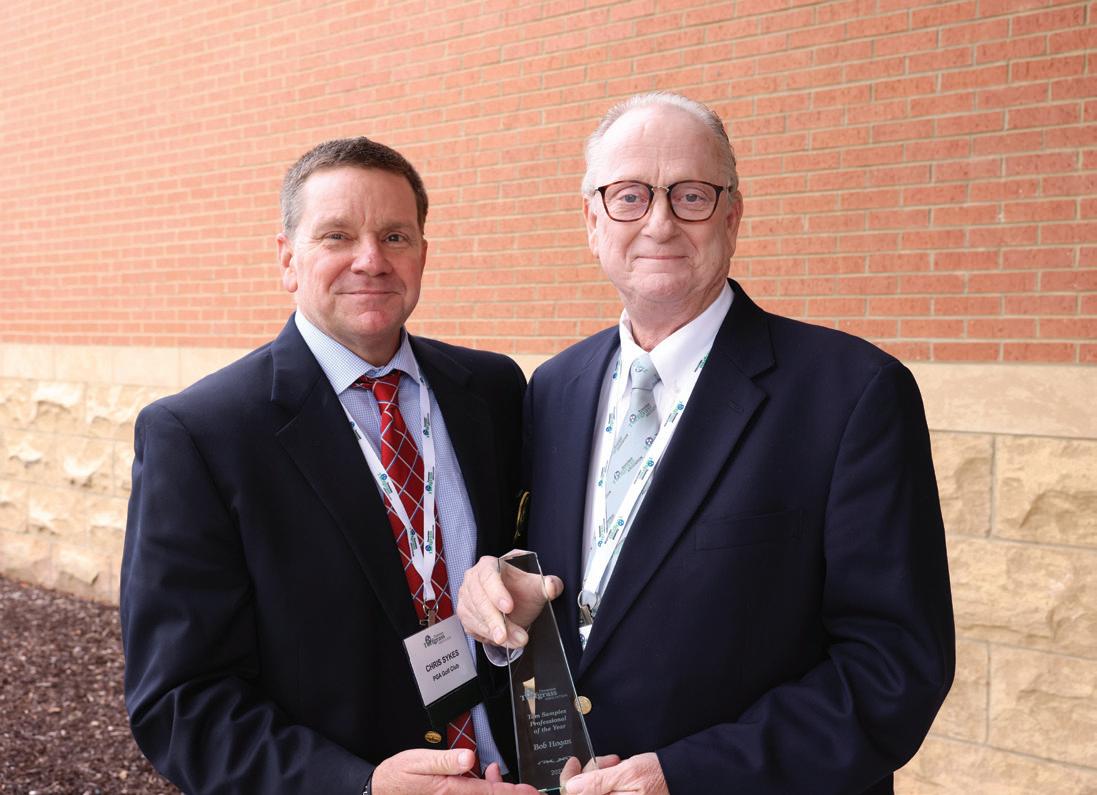
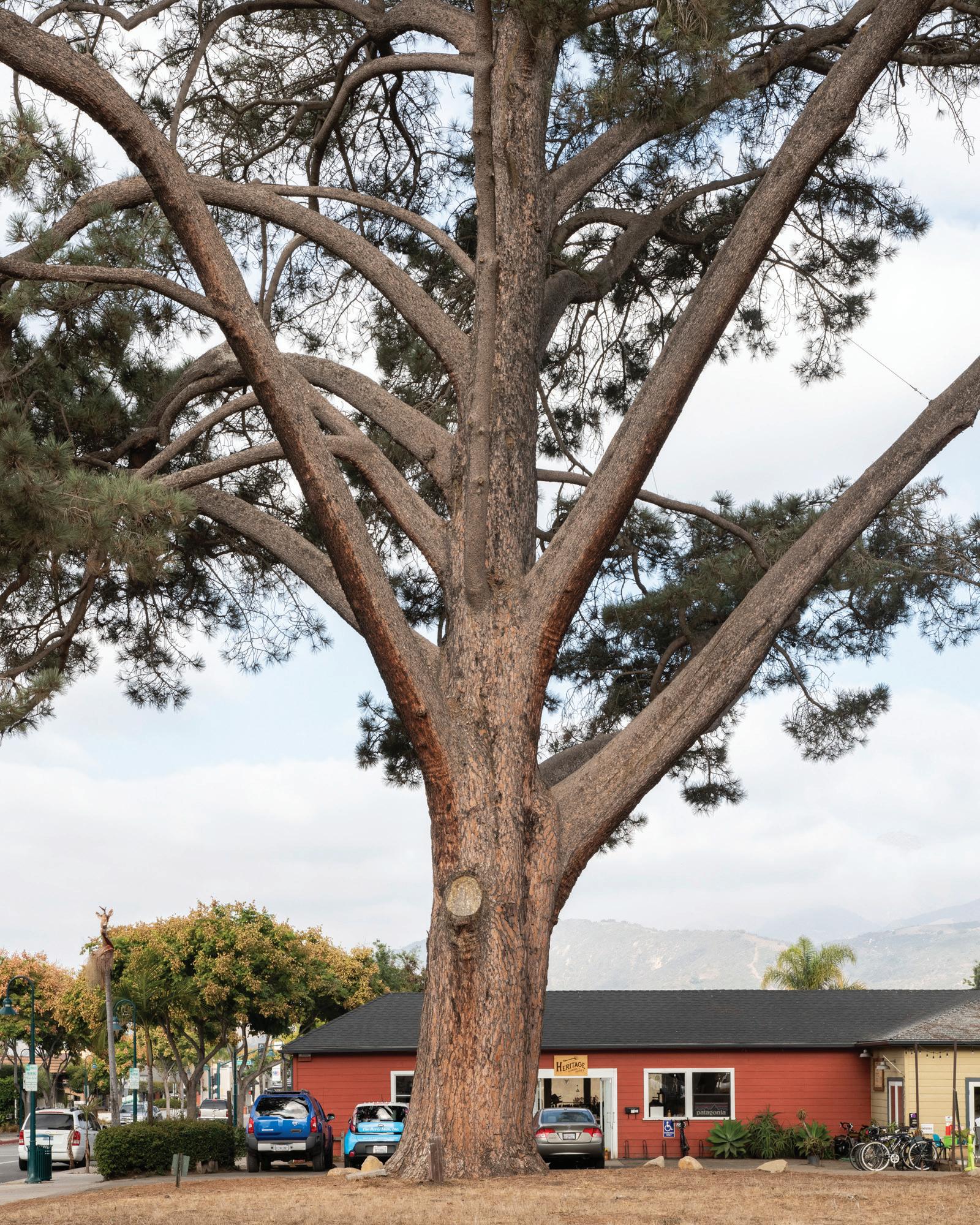
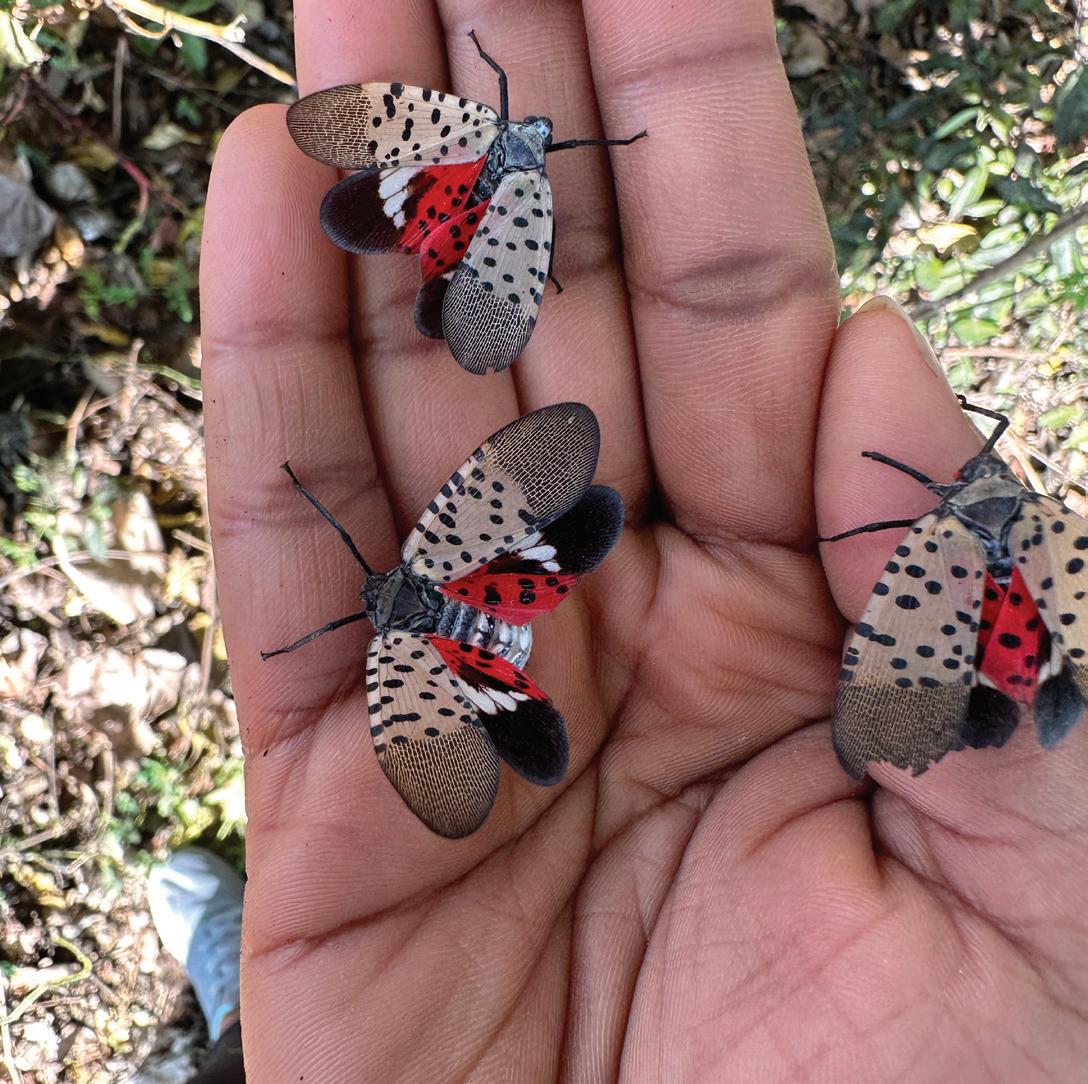
4 22 28 10 Find this issue, Podcasts, Events and More: THETURFZONE.COM TENNESSEE TURFGRASS FEBRUARY / MARCH 2024 The Official Publication of the Tennessee Turfgrass Association, Tennessee Valley Sports Field Management Association and the Tennessee Golf Course Superintendents Association FEBRUARY / MARCH 2024 TABLE OF CONTENTS From the TTA President 6 Calendar of Events 6 From the TVSFMA President 8 Index of Advertisers 9 The Turfgrass Team at the University of Tennessee, Knoxville 31 Spotted Lanternflies Detected in Middle Tennessee 28 The National Champion Tree Program: An honor for Tennessee, a boon for the Nation 22 Highlights from the 58th Annual TTA Annual Conference 10 FEATURES COVER STORY DEPARTMENTS
endangered)
At right, center: Pinus torreyana (critically



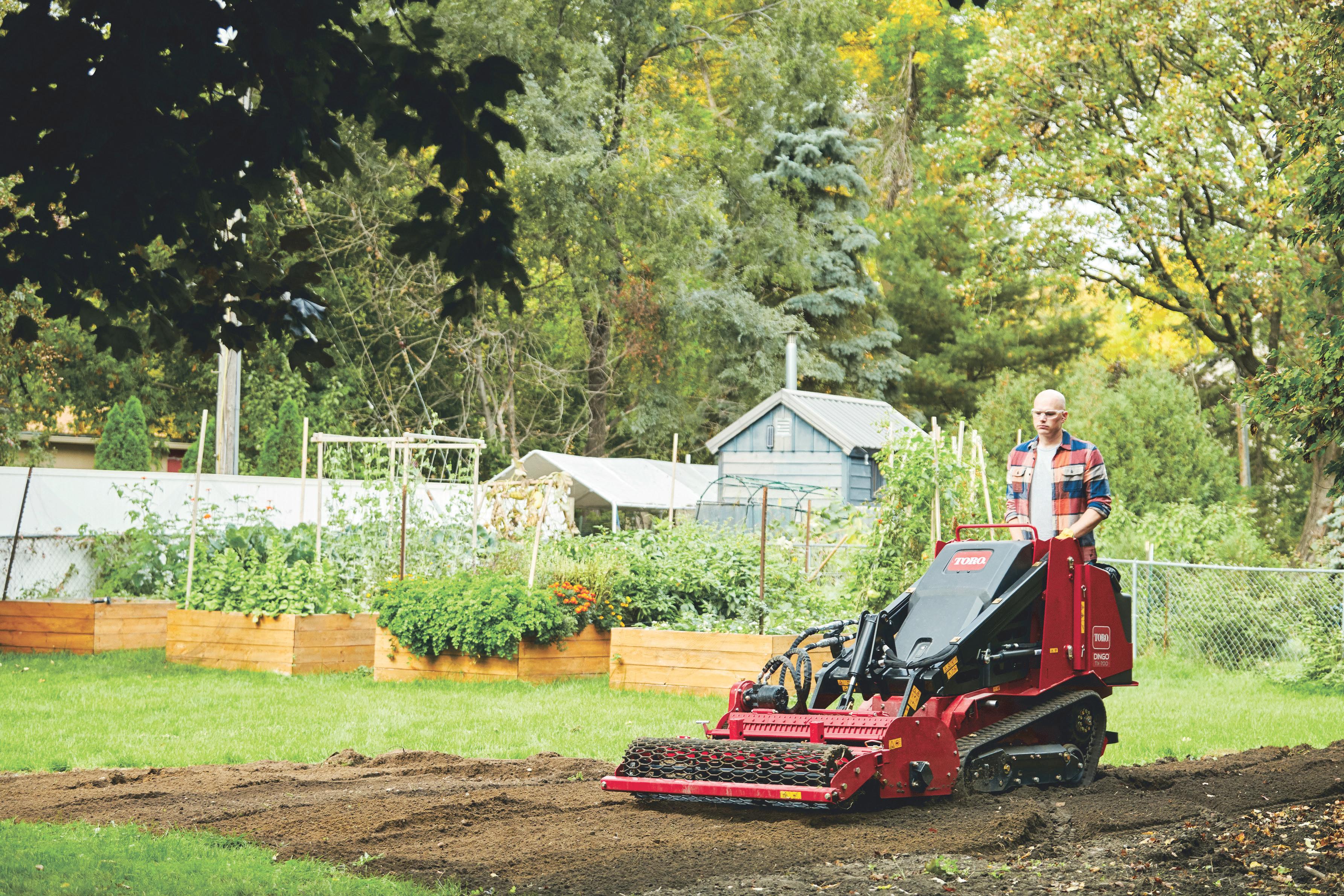


The NEW Dingo TX700. Powerful. Compact. Efficient. With a variety of attachments, the Dingo TX700 brings endless possibilities to the job site. Give us a call today, and get the most versatile piece of equipment you’ll ever own. NORTH CAROLINA | SOUTH CAROLINA | VIRGINIA | TENNESSEE | BERMUDA Office 615.726.8811 Orders 800.585.4784 www.smithturf.com
FROM THE TTA PRESIDENT
I wish you all a successful season and year.

Ihope everyone is thawing out after the cold weather we’ve had. Seems like we have had more precipitation in the past month than we received all fall. The Conference and Tradeshow was well attended, and it was great to see everyone. I hope you are refreshed and ready for the upcoming growing season. If you have any recommendations, comments, feedback, etc., please fill out the survey that was sent a few weeks ago or reach out to any board member.
We are always looking for ways to make the conference better. I am honored and looking forward to serving as president of the Tennessee Turfgrass Association. If you need anything, want to connect, or just need to vent, please reach out. Our board is dedicated to making this association the best it can possibly be. I wish you all a successful season and year. I’m looking forward to it.
Ryan Storey
2024 TTA President
CALENDAR OF EVENTS
SEPTEMBER 30, 2024
8:00 AM (EDT)
34th Annual East Tennessee Scholarship & Research Golf Tournament
Cleveland Country Club
UT Extension’s Beat the Heat Program
This 1-day program will provide classroom and hands-on education to turfgrass professionals for pesticide credits.
Tennessee
400
OCTOBER 7, 2024
9:00 AM (CDT)
2024 MTGCSA Scholarship & Research Golf Tournament
Hermitage Golf Course
JUNE 11, 2024 — Murfreesboro, TN
JUNE 13, 2024 — Sevierville, TN
JUNE 25, 2024 — Chattanooga, TN
JULY 9, 2024 — Memphis, TN
JULY 10, 2024 — Jackson, TN
PUBLISHED BY Leading Edge Communications, LLC
206 Bridge Street
Tennessee 37064 (615) 790-3718
EDITOR Dr. James Brosnan
TTA OFFICERS
President Ryan Storey Line to Line LLC
Vice President
Ryan Blair, CGCS
Holston Hills Country Club
Secretary / Treasurer
Bart Cash
Crossroads Sod Farm
Past President
Chris Sykes
Tellico Village
Executive Director
Melissa Martin
Tennessee Turfgrass Association
TTA 2023 BOARD OF DIRECTORS
Jason Bradley
Ben Dodd
Dan Johnson
Ashley Gaskin
Cal Hill
Jeff Huber
Jeff Kuhns
Bill Marbet
Wells McClure
Bob McLean
William Newsome
Mark Stovall
John Wagnon
Jeff Wyatt
TTA ADVISORY MEMBERS OF THE BOARD
Bill Blackburn
Dr. Jim Brosnan
Joe Hill
Dr. Brandon Horvath
Lynn Ray
Jeff Rumph
Dr. Tom Samples
Dr. Dennis Shepard
Dr. John Sorochan
Dr. Wes Totten
The Official Publication of the Tennessee Turfgrass Association, the Tennessee Valley Sports Field Management Association and the Tennessee Golf Course Superintendents Association
Ryan Storey
is the official publication of The Tennessee Turfgrass Association
Turfgrass
Road Franklin,
Franklin
Tennessee 37069 (615) 928-7001 info@ttaonline.org www.ttaonline.org
Franklin,
info@leadingedgecommunications.com
TENNESSEE TURFGRASS FEBRUARY / MARCH 2024 6
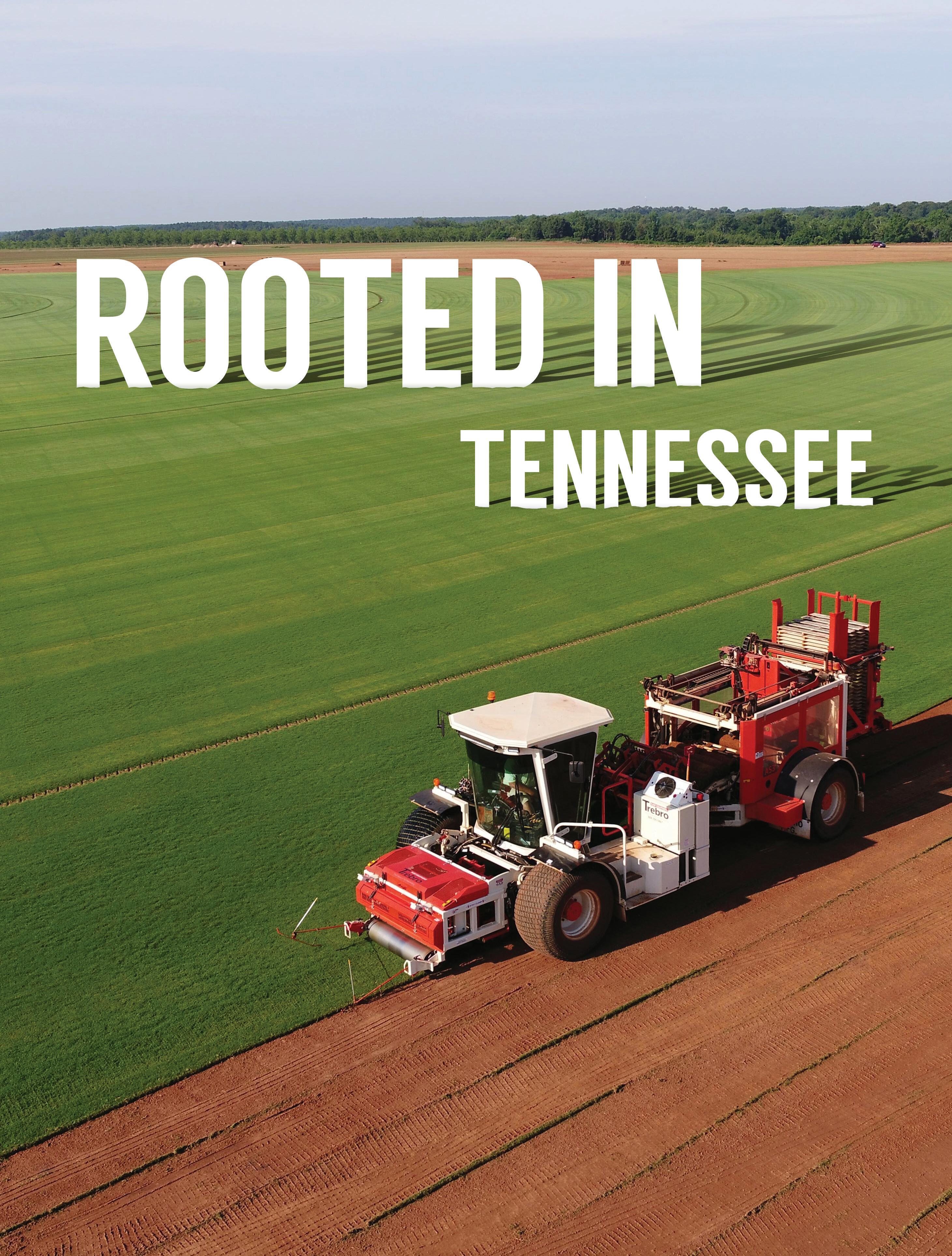

BENTON 423-597-6125 KNOXVILLE 865-381-5248 MANCHESTER 931-616-0154 NASHVILLE 615-912-2129 WHOLESALE.SUPERSOD.COM
Get wholesale pricing
Choose pickup or delivery dates
Request expedited delivery
View your purchase history SIGN UP NOW FOR YOUR
•
•
•
•
FROM THE TVSFMA PRESIDENT
2024 is off to a Fast Start!
Fertilizer has been ordered, equipment has been serviced and spring is right around the corner. Coaches, Athletic Directors, Players, Customers and your family are all needing something from you right about now, and as you already know managing everyone’s expectations is the most difficult part of our jobs. We can’t all be everywhere giving everyone exactly what they want right when they want it. So set their expectations and prioritize what needs to be done and when. Be sure to keep yourself organized and do your very best to meet the expectations you set. I truly feel if we can do this, we can all be successful this coming season. I fully understand it’s easier said than done, but I truly believe it is a recipe for success.
Green Grass, No Weeds.
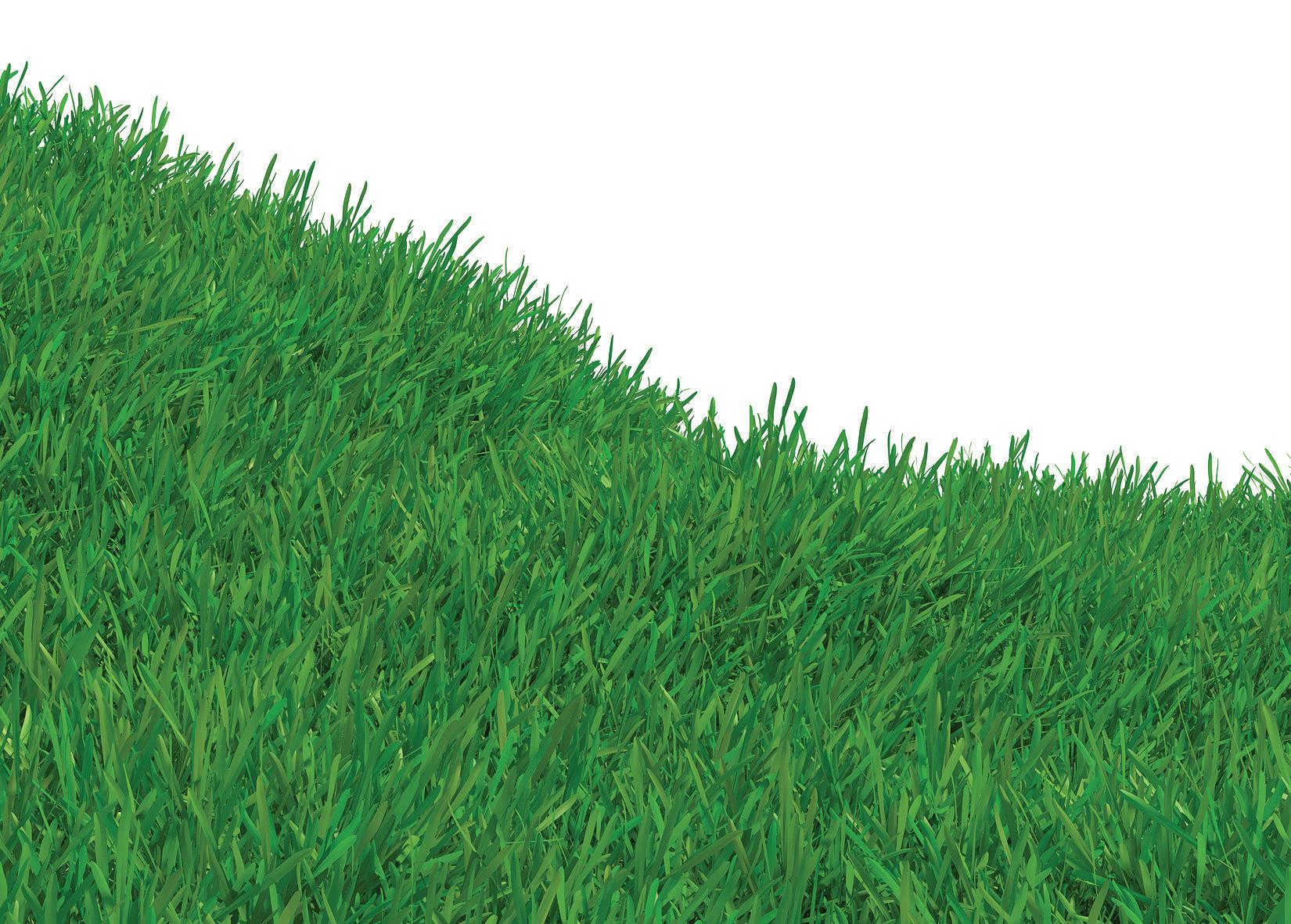 John Clintsman
John Clintsman

Last year was a good year for the TVSFMA as a whole. We had an involved board full of eager people that wanted to do what was best for our members and sponsors. We had some wonderful events in Alabama, Murfreesboro and Kentucky. We met and signed up new members and started the journey of new growth. We have already started the path to an even better 2024 with events scheduled in Knoxville, Alabama and Nashville!
We also have our new website up and running (www.tvsfma.org). From our website you can renew your membership / sponsorship and view upcoming meetings. Do you have a job opening? You can post it right on the website.
Every tool you need to have the greenest, most weed-free grass is right here.

We had a great year, but something was missing in 2023: YOU! Our meeting attendance was down at two of the three meetings, and some great sponsors have disappeared. I set a challenge to the board, and I want to include membership in that challenge. If you are joining us for any meetings, bring a friend who has never been or has not been in a while. Help us provide you with the best year of TVSFMA ever!
MARCH 12, 2024
UT Baseball game (TVSFMA Social)
MARCH 13, 2024
UT Knoxville Meeting
JULY 17, 2024
Toyota Field in Alabama
TBD: Nashville
John Clintsman
TVSFMA President
BUY/SHIP DIRECT Pro Tech Support Learn more: GreeneCountyFert.com
Healthy turf starts with Greene County Fert.
8 TENNESSEE TURFGRASS FEBRUARY / MARCH 2024


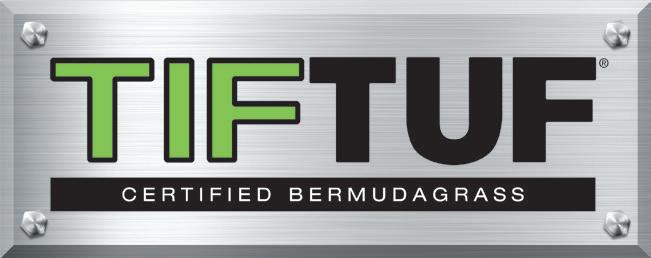
TENNESSEE TURFGRASS ASSOCIATION • TENNESSEE VALLEY SPORTS FIELD MANAGEMENT ASSOCIATION • TENNESSEE GOLF COURSE SUPERINTENDENTS ASSOCIATION 9 Buy Sod, Inc. 27 www.buysod.com BWI Companies, Inc. 21 www.bwicompanies.com Coosa Valley Turf Farms 9 www.coosavalleyturffarms.com Corbin Turf & Ornamental Supply 19 www.corbinturf.com Crossroads Sod Farm 31 www.csfsod.com DryJect 23 Greene County Fertilizer Co. 8 www.greenecountyfert.com Greenville Turf & Tractor, Inc 11 www.greenvilleturf.com Kesmac Back Cover www.brouwerkesmac.com McCurdy Sod Farms, LLC 21 www.mccurdysodfarms.com Mid-Atlantic STIHL 13 www.stihldealers.com North Georgia Turf Company, Inc. 15 www.ngturf.com Progressive Turf Equipment Inc. 30 www.progressiveturfequip.com Regal Chemical Company 3 www.regalchem.com Smith Turf & Irrigation 5 www.smithturf.com Sod Solutions 17 www.sodsolutions.com Super-Sod 7 www.supersod.com Sur-Line Turf, Inc. 24 www.surlineturf.com The Turfgrass Group Inside Front Cover www.theturfgrassgroup.com FESCUE TIFWAY 419 COOSA VALLEY TURF FARMS LLC GROWERS OF QUALITY TURF SINCE 1987 www.CoosaValleyTurfFarms.com (256) 927-4228 • (256) 927-4758 FAX • cvtf@tds.net 900 County Road 492 • Centre, AL 35960 MEMBER OF ADVERTISER INDEX The Tennessee Turfgrass Association serves its members in the industry through education, promotion and representation. The statements and opinions expressed herein are those of the individual authors and do not necessarily represent the views of the association, its staff, or its board of directors, Tennessee Turfgrass Magazine, or its editors. Likewise, the appearance of advertisers, or Turfgrass Association members, does not constitute an endorsement of the products or services featured in this, past or subsequent issues of this quarterly publication. Copyright © 2024 by the Tennessee Turfgrass Association. Tennessee Turfgrass is published bi-monthly. Subscriptions are complimentary to members of the Tennessee Turfgrass Association. Third-class postage is paid at Jefferson City, MO. Printed in the U.S.A. Reprints and Submissions: Tennessee Turfgrass allows reprinting of material. Permission requests should be directed to the Tennessee Turfgrass Association. We are not responsible for unsolicited freelance manuscripts and photographs. Contact the managing editor for contribution information. Advertising: For display and classified advertising rates and insertions, please contact Leading Edge Communications, LLC, 206 Bridge Street, Suite 200, Franklin, TN 37064, (615) 790-3718, Fax (615) 794-4524.
RECENT EVENT
CONFERENCE TTA 2024 TRADE SHOW
58th Annual TTA Conference and Trade Show was held at the Embassy Suites in Murfreesboro, Tennessee on January 8 – 10, 2024. Members, sponsors, vendors and educators joined to learn, socialize, honor award winners and prepare for another successful year. Thank you to all who made the event a success!

Outgoing TTA President Chris Sykes kicks off the conference.

Chris Sykes passes the baton to Incoming TTA President Ryan Storey

Dr. Tom Samples comes out of retirement to introduce his successor, Dr. Becky Bowling.
INDUSTRY PARTNERS
VENDORS




GOLD PARTNERS











Advanced Turf Solutions
AgChimp
Amway
AquaAid
BASF
Beard Equipment
Better Billy Bunkers
BuySod
BWI
Capillary Flow Control Solutions
Corbin Turf
Corteva
Crossroads Sod Farm
Dickens Turf
Envu
GCSAA
Geoponics
Golf Agronomics
Grassroots
Harco
Harrells
Heritage Professional Products
Hogan Company
Howard Fertilizer
Huntsville Tractor
Jackson Sand
JRM
Keeling
Kirkpatrick Turf
Ladd’s
Line to Line
McCurdy Sod Farm
Modern Turf
Nufarm
Performance Nutrition
ProSolutions
Ragan Technical Solutions
Regal Chemical
Sigma Organics
Simplot
SiteOne
Smith Turf & Irrigation
Sports Field Managers Association
STEC
Super Sod
Syngenta
T3 Weather
Tenbarge
The Andersons
TriTurf Sod Farm
Warner Athletic
TENNESSEE TURFGRASS FEBRUARY / MARCH 2024 Email TTA at: info@ttaonline.org 10
Thank You to Our Thank You to Our
The AND PLATINUM PARTNERS
SILVER PARTNERS
BRONZE PARTNERS
•
•
•
On

•
your course from John Deere Financial.
AS STRONG AS YOURS
fairways and greens worldwide, John Deere has a tradition
excellence.
trusted by
John
provide
your
support:
of
We’re
the best because only
Deere can
everything
golf business needs including in-depth knowledge and attentive
Exceptional
course mowers
specialty equipment.
golf
and
Reliable
parts and service from your local dealer.
Smart, connected technology for equipment and course management.
Financing
with
tailored
CONTACT US FOR CUSTOMIZED GOLF EQUIPMENT AND FINANCING SOLUTIONS TODAY! !ff!l(D Pate Kincaid - Regional Sales Manager, East TN (864) 419-6986 pk incaid@beardequipment.com Jim Roberts - Regional Sales Manager, West TN (864) 419-8871 jroberts@beardequipment.com David Sluder - East Tenn. TM (864) 419-3369 dsluder@beardequipment.com Bubba Jones - West Tenn. TM (864) 419-3391
Craig Ketelsen - Middle Tenn., Chattanooga TM (864) 419-0183 cketelsen@beardequipment com beardequipmentgolf.com
for it all —
solutions
to
bjones@beardequipment.com
A top-notch education lineup is a trademark of TTA conferences




Snapshots from the Trade Show Floor




The competition was steep at the TopGolf event


12
Jason Kuhn
Stonewall Solutions
Tyler Bloom
Tyler Bloom Consulting
Dr. John Sorochan University of Tennessee
TENNESSEE TURFGRASS FEBRUARY / MARCH 2024 Email TTA at: info@ttaonline.org
Dr. Brandon Horvath University of Tennessee
PRO
multi task multi tool ƒ


BATTERY
TACKLE ANY TASK The battery-powered KMA 135 R KombiMotor has 15 optional attachments, making it the ultimate piece of outdoor power equipment. Available at participating dealers. ©2023 STIHL Find Yours at STIHLDEALERS.COM KOMBI SYSTEM KMA 135 R
RECENT EVENT


Environmental Stewardship
GAYLORD SPRINGS GOLF LINKS, NASHVILLE
This year’s Environmental Stewardship award is presented to Gaylord Springs Golf Links located in Nashville, TN. Gaylord Springs has consistently demonstrated a commitment to environmental responsibility and stewardship through the Audubon Cooperative Sanctuary for Golf Program. Over the past few years, they have created nearly 10 acres of native areas throughout the course. These “no mow” areas create additional habitat that serve as corridors for wildlife moving through the course. This also allows for less inputs that lessens their environmental footprint. Being a member of Monarchs in the Rough Program they have created several acres on the course that are designated just for this program. Each participating course helps more monarchs breed, grow, and make the journey to their overwintering grounds. In addition to providing habitat for monarchs, courses are also raising awareness of monarch conservation. Gaylord Springs is also a member of Syngenta’s Operation Pollinator. This program is set up to provide habitat along with nesting and food resources for bees, pollinators, beneficial insects, as well as for small mammals and birds, enhancing overall biodiversity. They have also worked to improve nesting locations for native bird species such as wood ducks and blue birds and even worked with Nashville Electric System to construct a power pole platform so that Osprey could build a nest after several failed attempts. The nesting pair now return every year to utilize the nest they helped to create.
Congratulations to this year’s Environmental Stewardship award winner, Gaylord Springs. The award was accepted by Chris Young.
Private Course of the Year THE HONORS COURSE, OOLTEWAH
This year’s Private Course of the year is The Honors Course, located in Ooltewah, TN.
Established in 1983, The Honors Course is a private golf club located just northeast of Chattanooga in Ooltewah, Tennessee. The club’s mission is focused on amateur golf, and it has hosted many amateur championships throughout its history. In 1980 renowned golf architect Pete Dye was given the opportunity to work with over 400 acres of virtually untouched land at the foot of White Oak Mountain. This natural landscape was devoid of the distractions of land development and commercialism that usually accompany such ventures. When Dye’s work was completed a couple of years later, his design was considered radical because of its acres of tall native-grass rough, unusual zoysia fairways and terrifying lighting fast greens. Today the Honors Course is considered one of the most wellpreserved examples of Pete Dye’s architecture. In keeping with its philosophy, the Club continues to host Amateur events such as the Southern Amateur this past year. The Club has also strived to maintain its focus on playability by recently upgrading the course with new turf varieties throughout. It is easy to see why Golf Digest has ranked the Course #1 every year in the state of Tennessee from 1987 until today and continues to rank it in the top 30 courses in the United States.
Congratulations to this year’s Private Course of the Year award recipient, The Honors Course. This award was accepted by Will Misenhimer.
TENNESSEE TURFGRASS FEBRUARY / MARCH 2024 Email TTA at: info@ttaonline.org 14
The 2024 TTA Awards Luncheon was held on Monday, January 8th from 12:00pm to 1:30pm. Dr. Brandon Horvath presented the awards to recipients. Congratulations to all of our honorees!





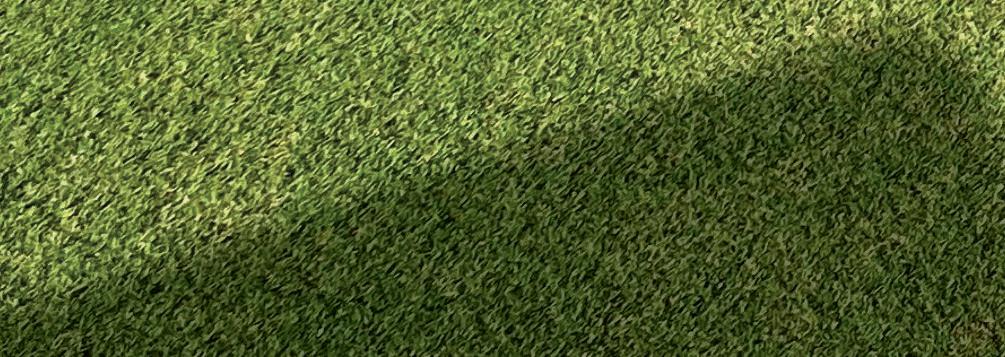



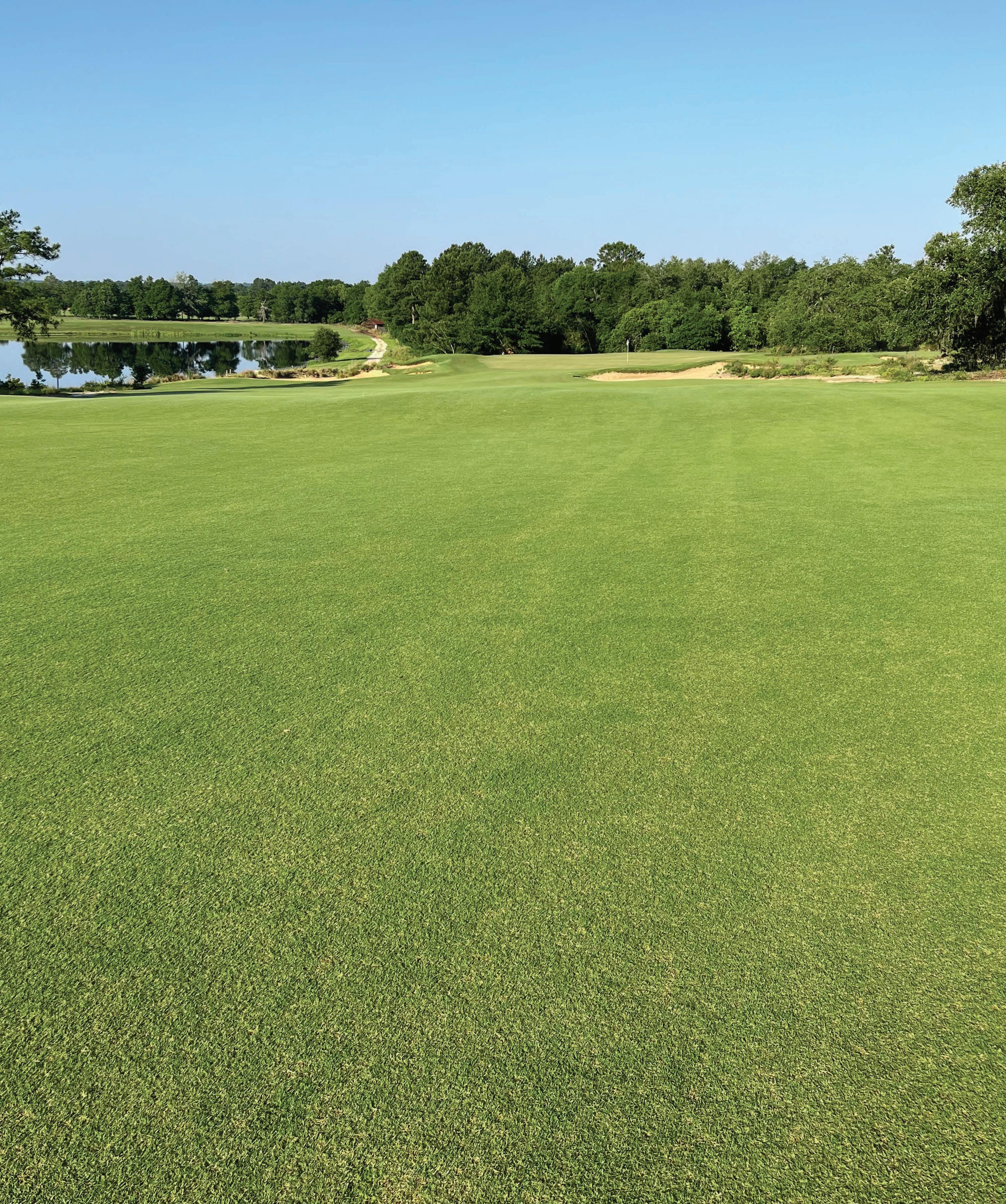



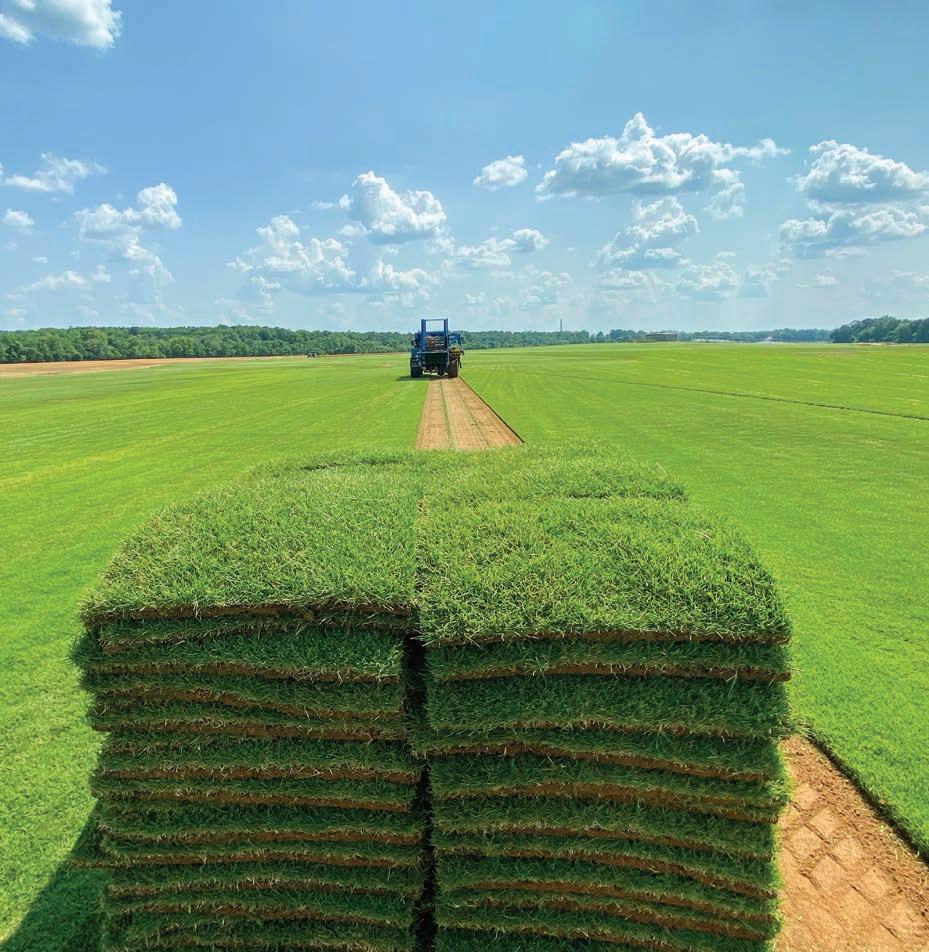



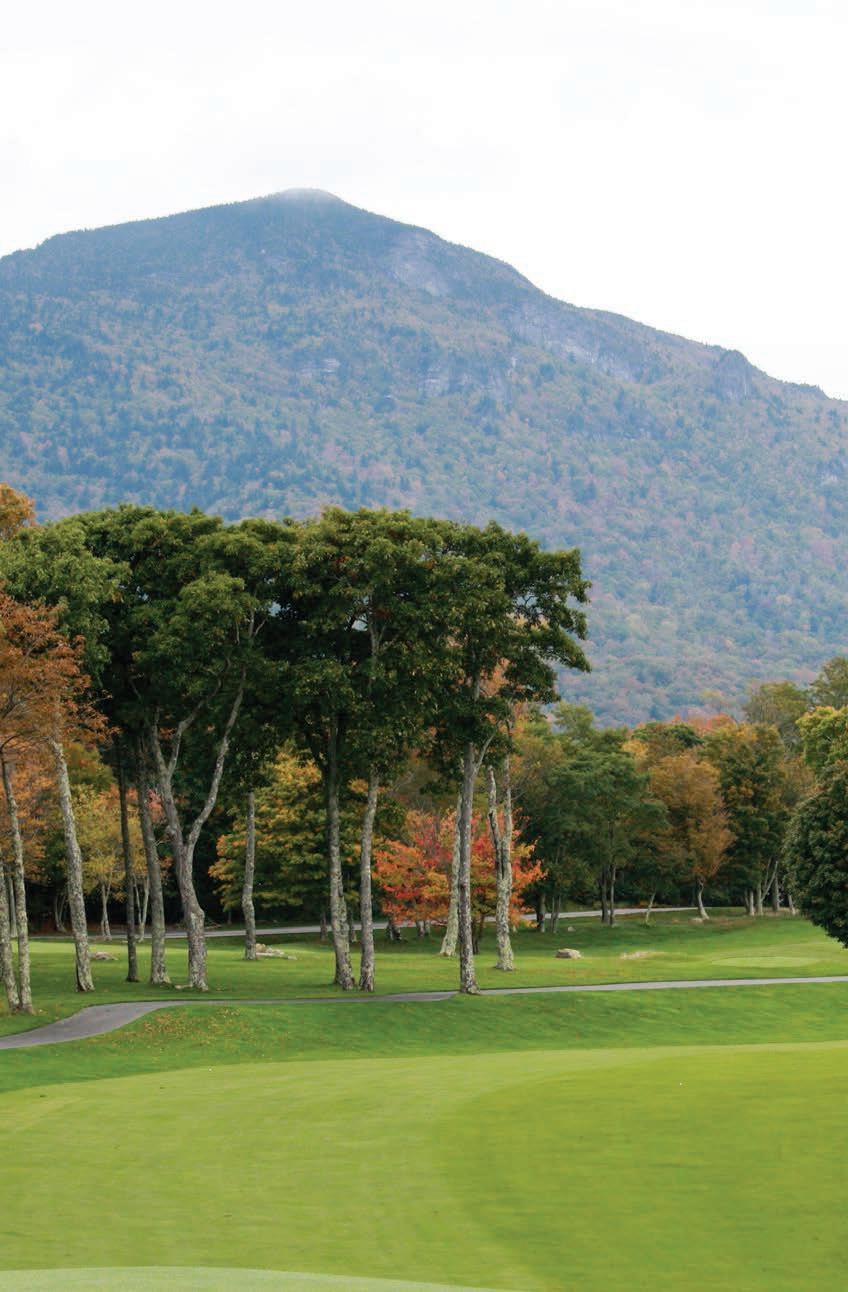
RECENT EVENT
Public Course of the Year
SEVIERVILLE GOLF CLUB, SEVIERVILLE
This year’s Public Course of the year is the Sevierville Golf Club located in Sevierville, TN.
The Sevierville Golf Club is a 36-hole facility owned and managed by the City of Sevierville. The Club consists of two distinct courses. The Highlands Course, which features rolling hills and plenty of freshwater ponds; and the River Course that plays alongside the Little Pigeon River. The courses host dozens of tournaments throughout the year including collegiate tournaments, American Junior Golf Association tournaments and the TSSAA High School State Championship to name just a few. The size of the property along with hosting so many tournaments can be challenging, and the biggest challenge the properties face is flooding caused by the Little Pigeon River. Overall, the Sevierville Golf Club is a very busy place with beautiful mountain views that provide a great golfing experience for its patrons.
Congratulations to this year’s Public Course of the Year, The Sevierville Golf Club. This award was accepted by Cody Wallace.
High School Field of the Year SPRINGFIELD HIGH SCHOOL FOOTBALL FIELD, SPRINGFIELD
This year’s High School Field of the Year is Springfield High School football in Springfield, TN.
Founded in 1982 and located in Robertson County, Tennessee, Springfield High School is a public school that serves students from ninth through twelfth grade. As a public school they raise funds to manage and operate the athletic programs separate from any school funds. The football team is tasked with raising funds for not only equipment, uniforms and gear, but also for field maintenance. Head football coach Dustin Wilson oversees the practice football field and the game field at the stadium. The funds that are earmarked for field maintenance come from an annual golf scramble fundraiser. The coaching staff paints the field with the help of the players on Wednesday and Thursdays leading up to home games. The staff, players and parents always make adjustments to their personal schedules in order to get the field ready for game days. Year after year the coaches, players and parents have worked hard to create an amazing playing surface for the team.
Congratulations to this year’s High School field of the year, Springfield High School football field. This award was accepted by Dustin Wilson.


TENNESSEE TURFGRASS FEBRUARY / MARCH 2024 Email TTA at: info@ttaonline.org 16

Collegiate Field of the Year PLAYER DEVELOPMENT COMPLEX, CHATTANOOGA
This year’s Collegiate Field of the Year is the Player Development Complex at the University of Tennessee Chattanooga.
First designed and built in 2009, the Player Development Complex was the joint home to the UTC golf teams and the First Tee of Chattanooga. In 2017 the complex became the sole home of the UTC golf programs. The 32-acre facility includes the team’s clubhouse, a vast practice range, multiple putting and short game areas, and even a few practice holes. Over the past few years, Chip Ward and his team have worked diligently to improve the playing conditions and enhance the facility. The putting surfaces have been enlarged to their original sizes with an emphasis placed back on playability. The main practice range has been vastly improved with multiple target greens and teeing area expansions on both ends of the range. An emphasis was also placed on branding the facility and making it a safe and inviting place for the golf team, which has resulted in everyone on the team now calling the Player Development Complex home. Colette Murray, the Women’s head golf coach at UTC said it best about the changes she has seen over the past few years, “Chip figures out a way to get it done and make it work, and I have never been more impressed by someone’s work than I am with his. He is truly a Godsend to UTC and its golf programs. We now have a facility where we can develop players, and we would not be able to do that without Chip.”
Congratulations to this year’s Collegiate Field of the Year, The Player Development Complex. This award was accepted by Chip Ward.
Municipal Sports Field of the Year JIM CARTWRIGHT FIELD, COLUMBIA
This year’s Municipal Sports Field of the Year is Jim Cartwright Field in Columbia, TN.
Sitting just outside the entrance to Maury County Park is Lindsey Nelson Stadium and Jim Cartwright field. The field is named for the longtime Central High School football coach who was instrumental in its construction, Jim Cartwright. The field is constructed of native soils and has a base surface of Tifway Bermuda overseeded with Rye for late season football and soccer. The field hosts a variety of sports throughout the year. It is also home to Central High School Football and Soccer, along with middle school football and soccer, band competitions, graduations, and other assorted functions.
Congratulations to this year’s Municipal Sports Field of the year, Jim Cartwright Field.
Professional Field of the Year
FIRST HORIZON PARK, NASHVILLE
This year’s Professional Field of the Year is First Horizon Park in Nashville TN.
The field is the home to the Triple-A Nashville Sounds which first opened for play in April of 2015. The 10,000 seat stadium has a field with a base of latitude 36 bermudagrass.
Congratulations to this year’s Professional Field of the Year, First Horizon Park. This award was accepted by Thomas.



TENNESSEE TURFGRASS FEBRUARY / MARCH 2024 Email TTA at: info@ttaonline.org 18
RECENT EVENT


Legacy Scholarship PRESTON POOLER
The Legacy Scholarship offers financial aid to children or grandchildren of active TTA members in good standing. Scholarship applicants are not required to be pursuing education in a turfgrass related field to be eligible for the Scholarship.
This year’s Legacy scholarship is awarded to Preston Pooler, son of Jason Pooler, owner of Tri-Turf Sod Farms in Paris, TN.
Preston is currently a freshman at The University of Tennessee Martin enrolled in Ag Business. Preston recently graduated high school with distinction and completed an industry certification in OSHA-10 Agriculture. Growing up working in a family business, Preston worked to find avenues that would advance his knowledge of the turf industry. Preston also showed his leadership abilities working with the Boy Scouts of America and through his growth in the Future Farmers of America program. Preston served as a 3-year officer for the chapter and was the regional FFA officer as well as the State Officer candidate.
Congratulations to this year’s Legacy Scholarship recipient, Preston Pooler.
Ernest Hardison Memorial Scholarship RILEY WARD
The Ernest Hardison Memorial Scholarship offers financial aid to students pursuing a career in turfgrass management.
This year’s Ernest Hardison Memorial Scholarship is awarded to Riley Ward.
Riley spent two years at Columbia State Community College in the Plant and Soil Science program and was a member of the CSCC baseball team. He is currently enrolled at the University of TN at Martin pursuing a Bachelor’s Degree in Agriculture focusing on Golf Course and Landscape Management. Playing baseball in both high school and college is what piqued Riley’s interest in maintaining sports fields. Being a student athlete, he has always helped with the field prep before and after games and even had the opportunity to work the past two years at the TSSAA State baseball tournament. Riley worked with Bill Marbet at Gametime Sports Fields during his time at Columbia State and began interning at Greystone Golf Course last summer. He will be an intern with the Nashville Sounds this coming summer and is excited for his future in the sports turf industry.
Congratulations to this year’s Ernest Hardison Scholarship recipient, Riley Ward.


Check out the next issue of Tennessee Turfgrass for a Member Spotlight on Bob Hogan!

RECENT EVENT TENNESSEE TURFGRASS FEBRUARY / MARCH 2024 Email TTA at: info@ttaonline.org 20
Tom Samples Turfgrass Professional of the Year Award BOB HOGAN



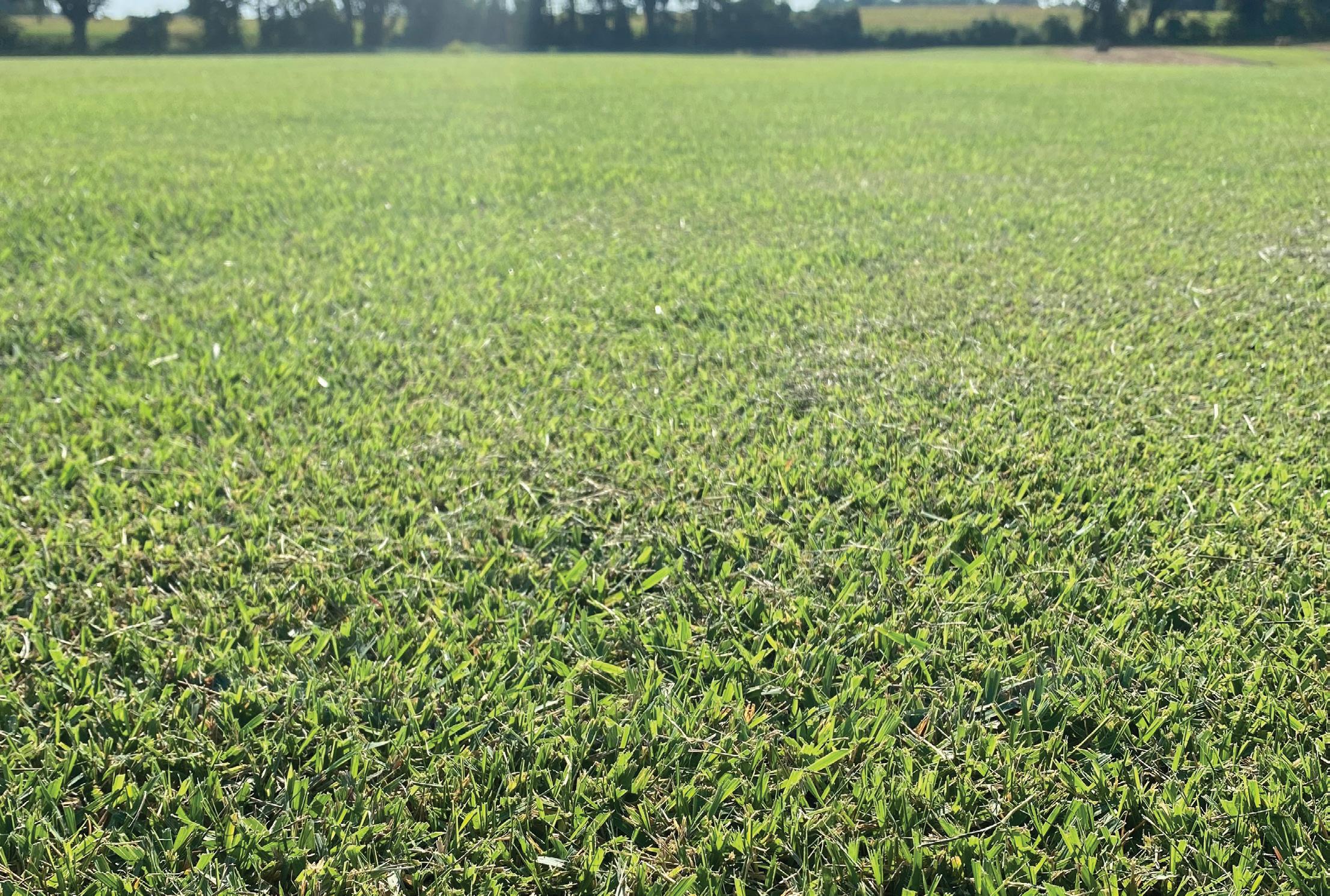
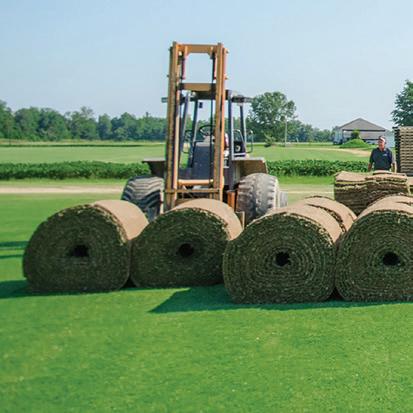
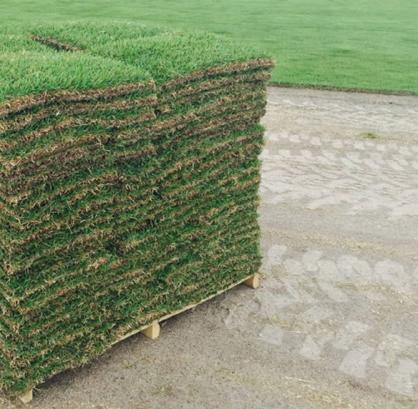
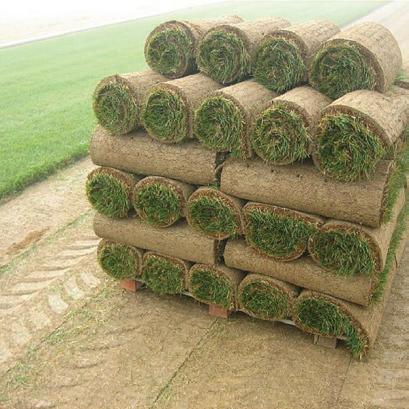



BWI Memphis 4924 Hickory Hill Memphis, TN 38141 800-489-8873 Andy Milligan 901-428-7004 andymilligan@bwicompanies.com BWI Nashville 1044 Firestone Pkwy La Vergne, TN 37086 615-903-9195 Lee Barclay 901-233-2737 leebarclay@bwicompanies.com We provide the best selection of turf and landscape products, competitive prices, and excellent customer service. www.bwicompanies.com Over 600 acres of 5 natural grass varieties to fit your needs! 731-692-3515 & MCCURDYSODFARMS.COM CURRENTLY CUTTING
TREE PROGRAM: CHAMPION NATIONAL THE
An honor for Tennessee, a boon for the Nation
By Jaq Payne, National Director of the Champion Tree Program

California, 2,500 miles away from Tennessee, a forest of redwood trees has been growing steadily for over two millennia. Deep within this forest, the tallest tree recorded by the Champion Tree Program stands, with an entire ecosystem hidden and thriving in its massive canopy. This gargantuan Coast Redwood (Sequoia sempervirens), known as Lost Monarch (Fig. 1), clocks in at an unfathomable 321 feet tall. That’s 21 feet taller than a football field is long (minus the end zones). That’s 16 feet taller than the Statue of Liberty atop her pedestal. It’s also as tall as 64.2 Dolly Partons stacked on top of each other. Although most foresters don’t use “Dolly Partons” as a unit of measurement, the National Champion Tree Program is seeking new ways to engage the creative minds of the public and convey the majesty of these gentle giants.

FEATURE
In TENNESSEE TURFGRASS FEBRUARY / MARCH 2024 Email TTA at: info@ttaonline.org 22
Fig. 2: Joseph Stearns with L. tulipifera
1 2
Fig. 1: Lost Monarch Sequoia Sempervirens
Aerate and Play Right Away!
The
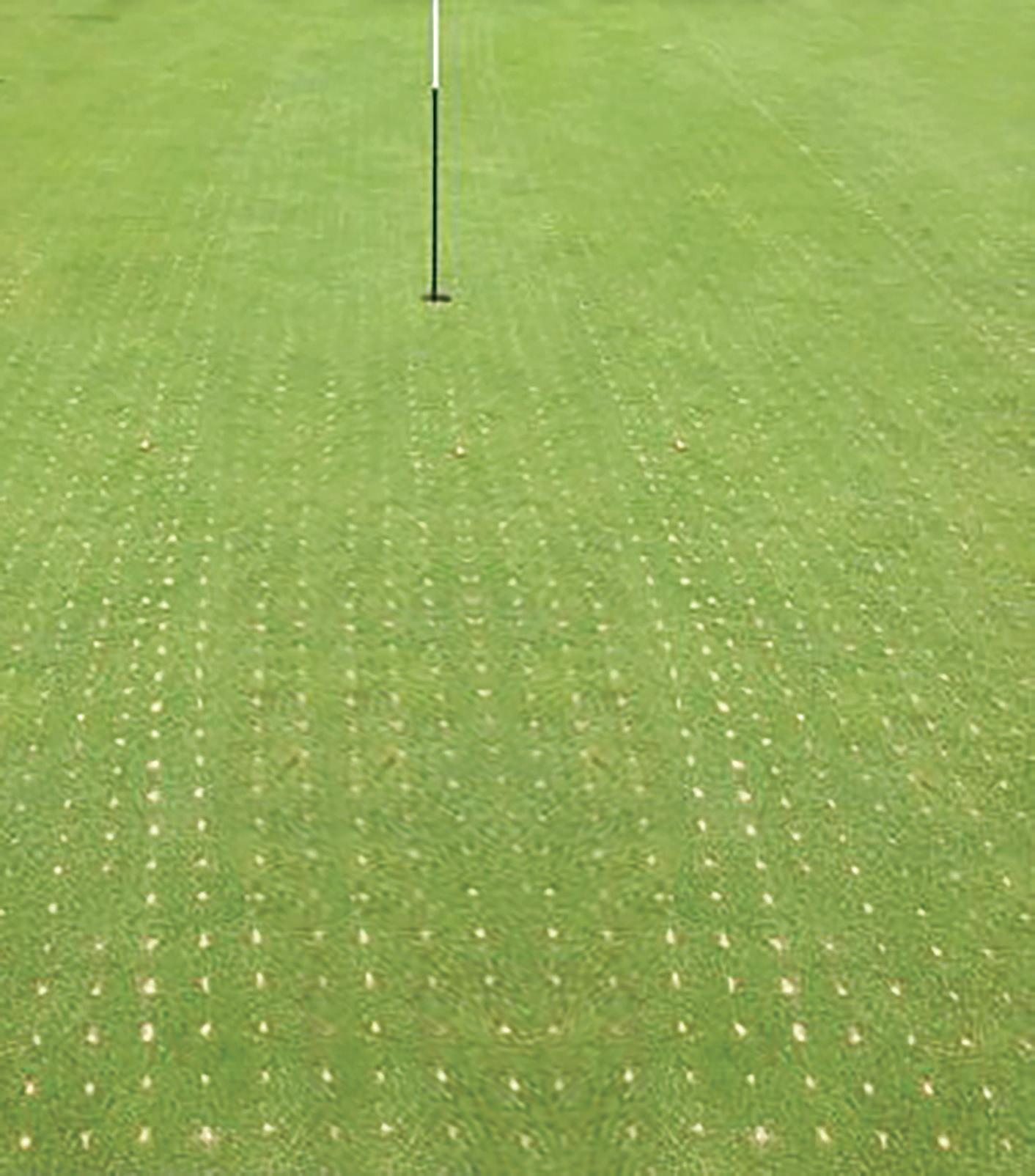
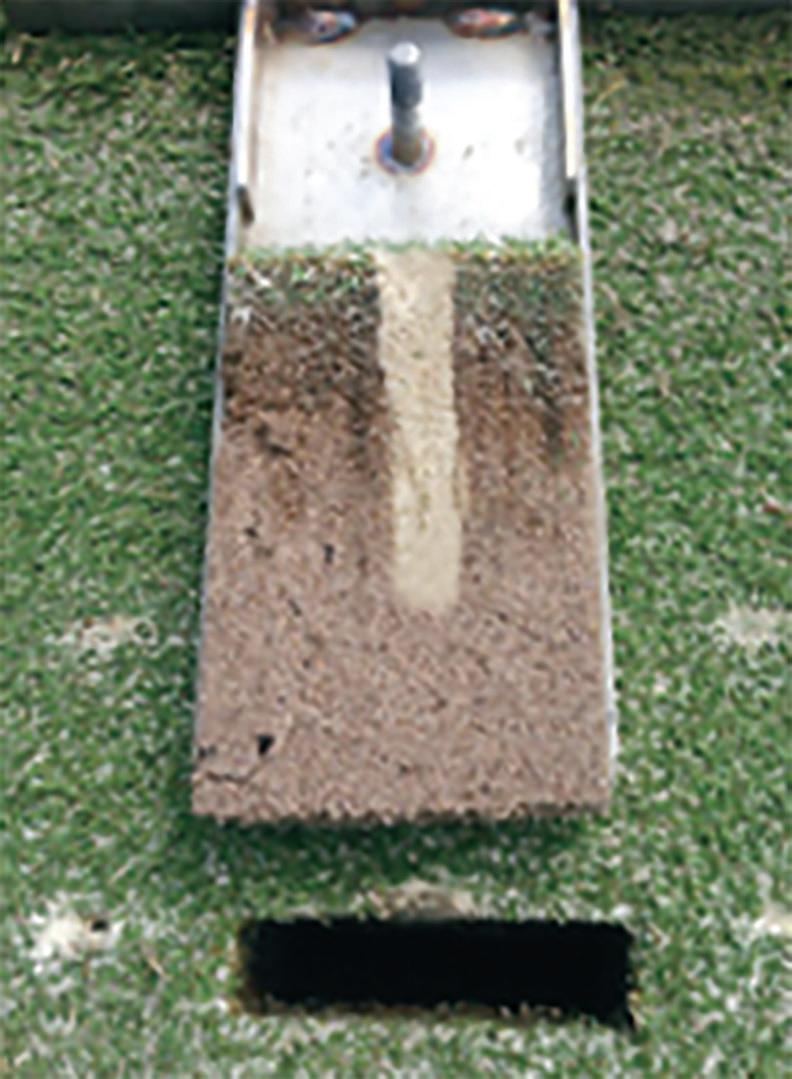
very
The dots are sand that is level with the turf.
water based injection system that blasts holes through the root zone and fractures the soil profile. Plus, it automatically fills holes as it aerates.
down time, increased revenue.
Decreased
surface is
“puttable.”
high-pressure,
DryJect® is a
a
difference
DRYJECT.com Tennessee Turf Services Mitch Alexander 615-973-2034 tnturfservices@gmail.com Call Today! NO BUMPS!
hour following a DryJect® treatment. Aerate, amend and play right away
DryJect® makes
big
in playability … right away!
One
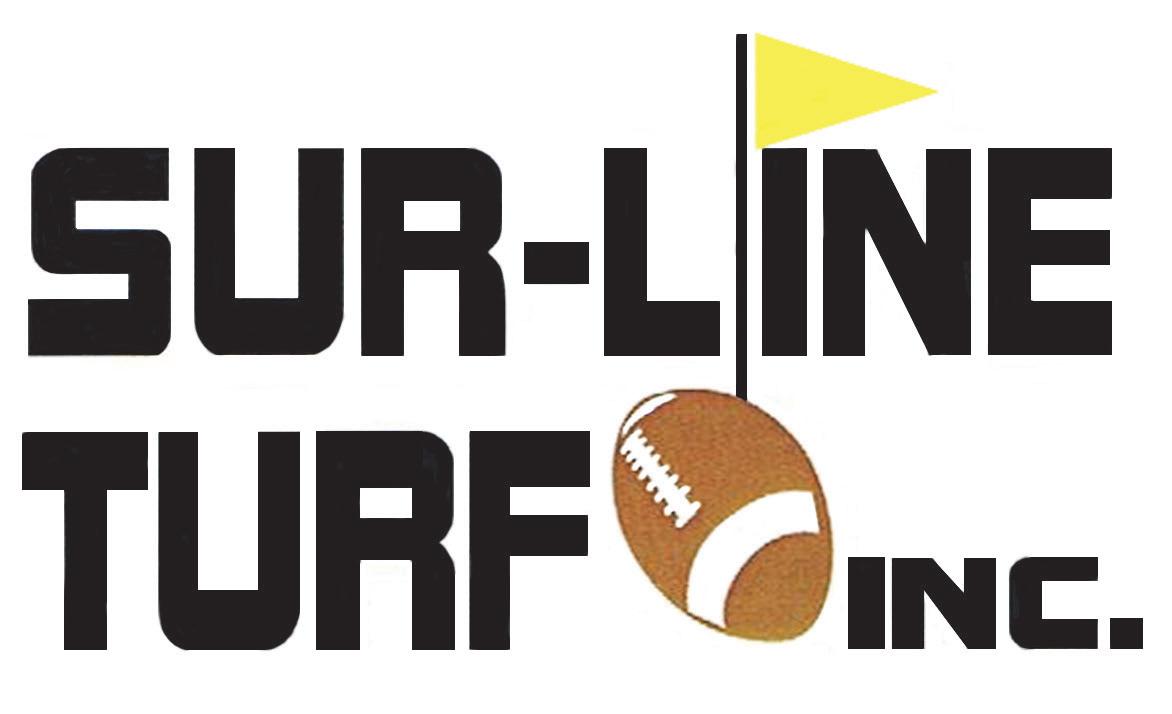
Office: 205-333-1776
www.surlineturf.com • email: surline1@gmail.com
SPECIALIZING IN:
Athletic Field Construction and Renovation
Golf Course Construction and Renovation
Laser Grading • Super Topdressing
No-Till Planting • Sodding • Sprigging
On-Site Custom Built Turf Covers
Fertilizer • Seed • Turf Colorant
Sod Staples • Bunker Nails • Bunker Liners
Sod • Sprigs • Sand • Mixes
Infield Mix • Infield Conditioners
Warning Track Stone • Mound Clay
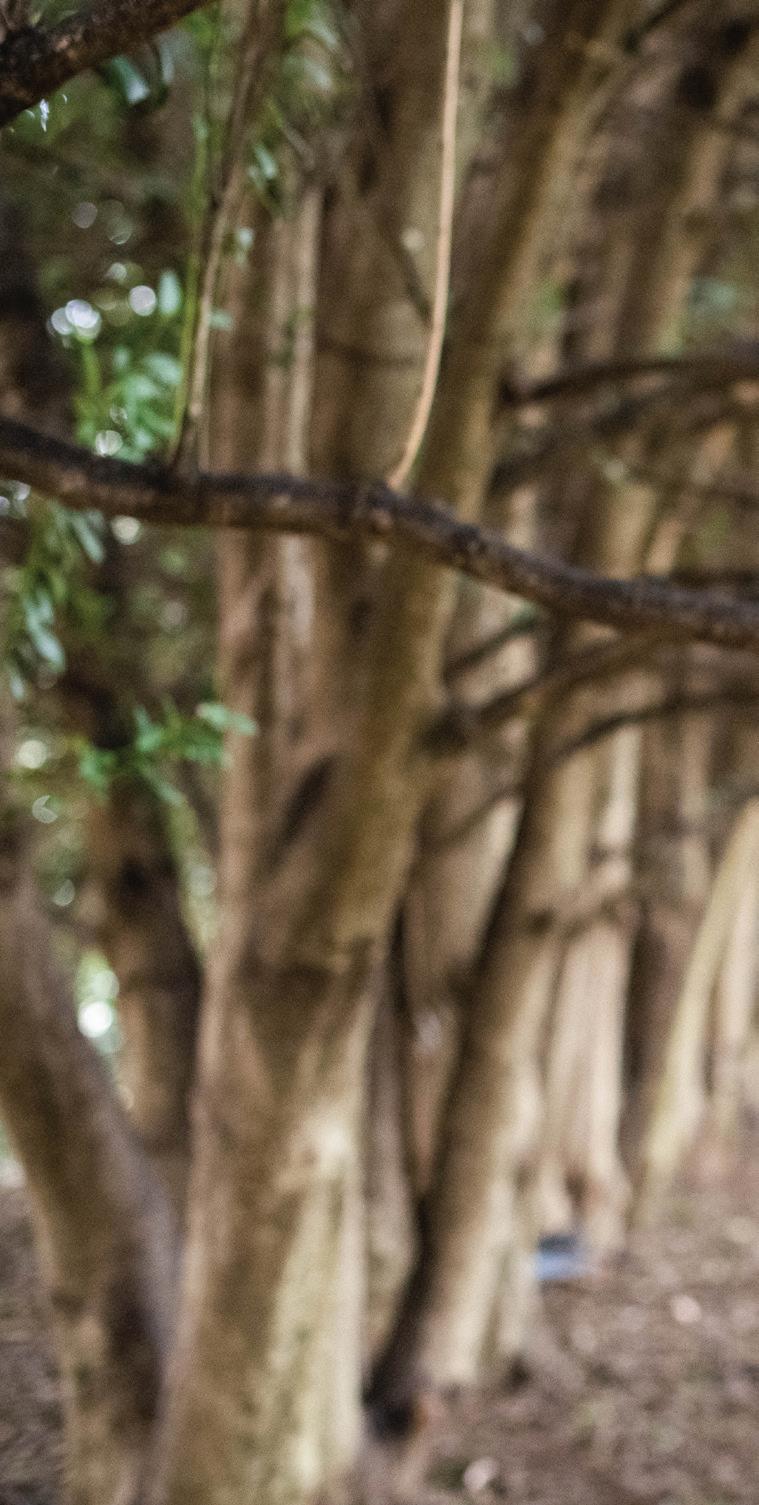

TENNESSEE TURFGRASS FEBRUARY / MARCH 2024 Email TTA at: info@ttaonline.org 24
Fig 4: Jaq kayaking to TN Bald Cypress Champion. Photo by Kayla Stuart
Fig. 3: Jaq Payne. Photo by Taryn Ferro, Aw Snap Photography


The Champion Tree Program keeps the record of the largest trees in the United States of America. It started in the early 1940s when American Forests Magazine published an article penned by Joseph L. Stearns, calling for the recognition and protection of the largest trees in the country. He is pictured in the magazine, standing next to the burned remains of what was once the world’s largest Tulip Poplar (Liriodendron tulipfera) (Fig. 2), marveling at the wonder of its size and the tragedy of its loss due to the careless mistake of a couple hunters seeking refuge in the tree from the winter chill. American Forests heartily endorsed this proposition of finding and preserving America’s largest trees, encouraging readers to send in the location and size of the large trees they were aware of. “Such a conservation activity, it is believed, will have incalculable benefits, not only in stimulating greater tree appreciation, but in establishing a nation-wide laboratory for tree and forestry studies by future generations.”
The University of Tennessee is a natural fit for the future of this program. In mid-2023, the decision was made to transfer the program from American Forests to the University of Tennessee Knoxville, School of Natural Resources and a national search was conducted during the summer of 2023. As the outcome of that search, I was selected to be the National Champion Tree Program Leader. This is an honor both for the University of Tennessee and for our state – Tennessee are home to the heart of the deciduous forest, and a great many people across the state are passionate about our beautiful trees. My name is Jaq Payne (Fig. 3), and I have had the joy, pleasure, and challenge of running the state of Tennessee Champion Tree Program (as featured in the Winter 2021 issue of Tennessee GreenTimes) for the past couple years, and my vision for the future of the National Champion Tree Program is clear and bright.
These trees are remarkable, not just for their size but for their contributions to our community. Some stand in graveyards, taking in the echoes of the pain of human loss with their silent stature, moving on a timescale that we can scarcely understand. Some of these marvels of nature are found in urban backyards, farmlands, and as with Tennessee’s State Champion Bald Cypress (Taxodium distichum), in the middle of a lake accessible only by kayak (Fig. 4). Not only does documenting these trees provide data that we can use to better understand tree morphology and physiology, but the experience also yields a wealth of cultural data – How do humans interact with and think about trees? What types of people have access to these trees? How do we increase the amount of people that are able to draw strength and peace from their connection with nature?
This re-imagining of the Champion Tree Program has three main pillars: Conservation, Information, and Education. First, conservation: 53 out of the 563 National Champion Trees, approximately 9% of the currently represented species, are listed on the IUCN Red List as Near Threatened, Vulnerable, Endangered, Critically Endangered, or Extinct in the wild. One such specimen is the National Champion Quercus tomentella, which is listed as endangered in the IUCN Red List.
TTA • TVSFMA ASSOCIATION • TGCSA 25
FEATURE 3 4

A photo from American Forests shows the tree’s impressive stature (Fig. 5). Preserving the genetic material of these specimens, collecting seeds, propagating seedlings with partners across the country, and even cloning trees when it is safe and possible to do so, could have far-reaching implications in the world of tree preservation. Some of these species do not exist in any ex-situ collections, so ensuring that these species are represented in botanical gardens and arboretum is not only a priority for direct conservation, but also for engaging the public in recognizing these species and their value.
Next, information: With a strong national program, we are able to invest more in accurate measurement techniques and making sure that our State Coordinators and those who help them are trained correctly in how to measure trees. This goal is achieved through the help of the National Cadre of Tree Measurement Experts, which was started in the mid 2010’s by American Forests and a group of math and tree experts. By ensuring that we have key data that is as accurate as possible, we will be able to use this information to move toward the original 1940’s vision for the program: to serve as “a nationwide laboratory for tree and forestry studies by future generations.” This is one of the reasons that the University of Tennessee, a land-grant university lauded for its research, is the perfect home for the future of the Champion Tree Program. We also have the benefit of UT Extension, the hands of the university reaching out into the community, disseminating the empirical research being performed.
Finally, education: we are positioned to be able to use the information that we gain about these trees, along with what we learn from our focused conservation efforts, to help educate the public about the importance of trees. Large, mature trees like these contribute to our communal well-being and are vital components of a healthy, vibrant ecology in the greenspaces around us. By communicating the value of these trees, we will change hearts and minds, shift priorities, and expand nationally the focus of tree

conservation work beyond just the simple planting of seedlings and young trees. We seek to fully embrace and instruct about the maintenance and protection of trees, whether they are Champions or not.
Many of the Champion Trees are near the end of their natural lives, having reached their highest heights and now are entering a state of decline. We must ensure that the public is educated on the importance of hiring certified arborists to maintain and sometimes remove these massive specimens when it is no longer safe for these sentinels to stand around people and property. Balancing the need for safety with the massive impact these trees have on their environment is a challenging endeavor. However, when certified arborists are engaged in making those assessments and property owners are helped to better understand their trees, we can more fully honor the life cycle of these distinguished tree specimens and find creative ways to utilize the wood that may be reclaimed from their timely or necessary removal.
It’s been said that the future is the past altered by the present. In this moment, the choices that we make will affect not only our immediate descendants, but their descendants and beyond (Fig. 6, Sitka Spruce photo courtesy of Brian Kelley, Gathering Growth Foundation, with permission of American Forests). As I imagine the future society that we are building right now, the natural world that we are borrowing from our great-great-grandchildren, I am heartened by the passion that Champion Trees evoke. Even our smallest Champion Trees, like the 9-foot-tall Potatotree (Solanum erianthum) in Texas (Fig. 7, courtesy of National Champion Tree archives), are beloved and held in high esteem by tree lovers across the country. By honoring these giants of their kind and by advocating for their protection, maintenance, and recognition, we are speaking directly to the people living on this land a hundred years from now. Letting them know that “We saw the immense value of these members of our ecological community, and we did our best to ensure that you get to enjoy their presence, too.”
TENNESSEE TURFGRASS FEBRUARY / MARCH 2024 Email TTA at: info@ttaonline.org 26
5 6


More information about the National Champion Tree Program can be found at or by emailing nationalchampiontree.org contact@nationalchampiontree.org
Nominations will reopen to the public in January 2025.
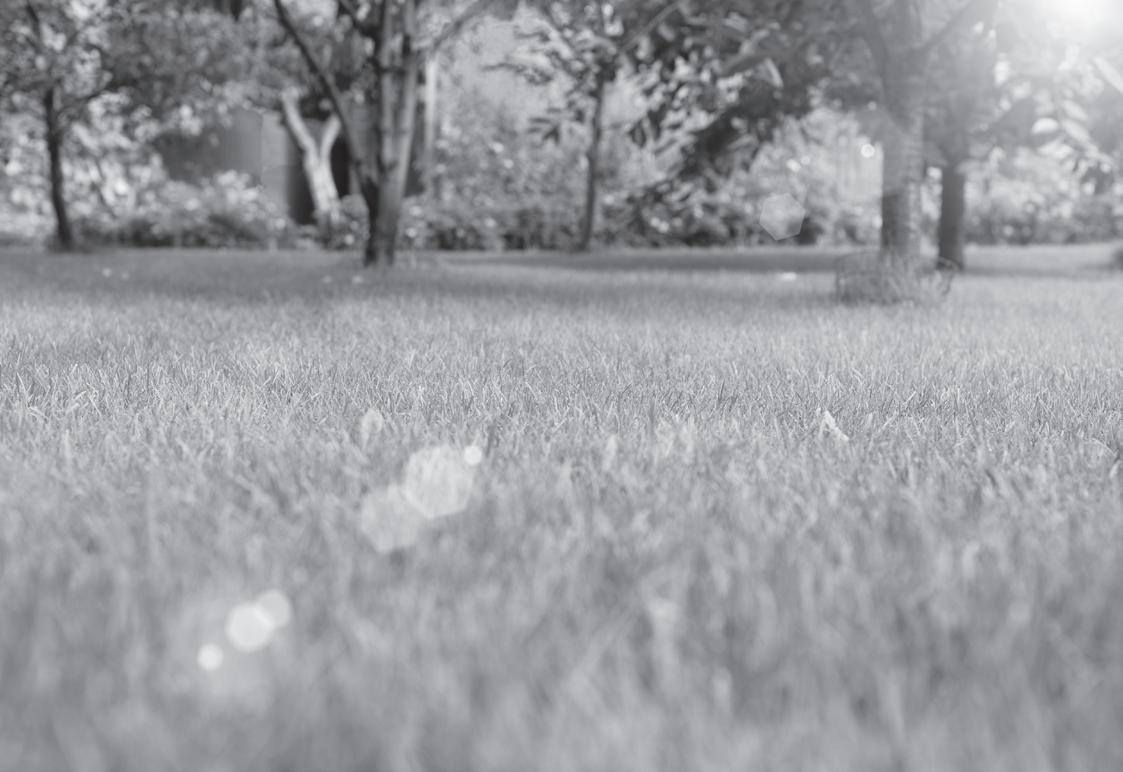

This article was written for Tennessee GreenTimes and is reprinted with permission.



 Fig 5: Quercus tomentella (endangered)
Fig 6: Sitka spruce
Fig 7: Solanum erianthum (potato tree), the shortest champion
Fig 5: Quercus tomentella (endangered)
Fig 6: Sitka spruce
Fig 7: Solanum erianthum (potato tree), the shortest champion
7
SPOTTED LANTERNFLIES
Detected in Middle Tennessee
By Midhula Gireesh, Assistant Professor, Entomology and Plant Pathology Department, UT Extension, and Cindy Bilbrey, State Entomologist, Tennessee Department of Agriculture
What is spotted lanternfly?
The spotted lanternfly (SLF), Lycorma delicatula (White), is a non-native planthopper in the Family Fulgoridae that was first detected in the United States in Pennsylvania in September of 2014 (Fig. 1). SLF is native to China, India and Vietnam and has been introduced into Korea, Japan and Taiwan (1,4). Since its initial detection in the U.S., SLF has been confirmed in other states such as New Jersey, Virginia, Delaware, West Virginia, Maryland, Connecticut, New York, Ohio, Indiana, Massachusetts, and North Carolina (3). Recently several other states have confirmed SLF, as well. An up-to-date information can be accessed at: https://lookerstudio.google.com/reporting/b0bae43d-c65f-4f88bc9a-323f3189cd35/page/QUCkC
In September 2023, the Tennessee Department of Agriculture confirmed detection of SLF in Davidson and Wilson Counties in middle Tennessee. Among SLF life stages, adult SLF and their egg masses are the most common hitchhikers that are associated with transportation by humans. These also are the most common forms of long-distance SLF dispersal (5). In Tennessee, SLF adults were found near a railroad track in Davidson County where train cars are often held idle for a few days before resuming progress toward their planned destination. It is possible that an egg mass that was attached to a train car hatched at that location and then nymphs were able to locate a suitable host plant on which to complete their life cycle.
How can you identify spotted lanternfly?
Adult SLF are approximately 1 – 1.5 inches long and have beige or grey front wings with black dots and dashes. The hind wings are especially colorful with a band of red, white, and black, visible when the front wings are spread (Fig. 2). Nymphs (juveniles) in their first, second and third instars are black with white spots. Fourth instar nymphs are red and black with white spots. The egg masses are brown with a gray waxy covering and may contain up to 60 eggs (Fig. 3).

What is the life cycle of spotted lanternfly?
Adult SLF emerge in late summer and aggregate on host plants to feed. After mating in September, female SLF begin laying egg masses on host plants and other surfaces (Fig. 4). Egg laying continues into November. In middle Tennessee, egg masses were found on railroad ties, under rock ledges, on tree of heaven, bush honeysuckle, poison ivy, downed tree limbs, and logs. Egg masses were also found under peeling tree bark, in hollow trees, and on the undersides of plywood and lumber. Reports from other states include egg laying onto smooth surfaces such as tree trunks, fence posts, rusted steel, cut stone, and other incidental objects, like cars and outdoor furniture (2).
Egg masses overwinter and then first instar nymphs begin emerging in May. Nymphs mature to the second and third instar (stage) in June and July, and molt into the more colorful fourth instar in July (3). SLF nymphs molt into their winged adult form in mid-summer. Adults will feed on host plants until females complete laying eggs in late November (3).
What does feeding damage look like? What is the economic impact?
SLF use piercing-sucking mouthparts to ingest plant nutrients. Tree of heaven, Ailanthus altissima , a tree native to China, is the preferred plant host (2). First through third instars, however, will feed on the tender plant tissue of a broad range of host plant species. The fourth instar nymphs and adults tend to have a narrow host range, with the preferred hosts being tree of heaven, grapes (Vitis spp.), black walnut (Juglans nigra), silver maple (Acer saccharinum), red maple (Acer rubrum), and willow (Salix spp.) (1,7).
The economic impact from SLF to key host plant commodities can be direct or indirect. Direct damage involves plant decline, stem flagging, and branch dieback that can occur when a large number of adults feed on a single tree. In Pennsylvania, flagging on black walnut has been observed. Instances of other host plant mortality due to SLF feeding have not yet been reported (6).
FEATURE TENNESSEE TURFGRASS FEBRUARY / MARCH 2024 Email TTA at: info@ttaonline.org 28
Fig. 1. Spotted Lanternfly adult.

In vineyards, however, up to 90% loss of grape yield and reduced fruit quality have been reported, with surviving vines failing to set fruit (2,3). Both the adults and nymphs excrete a sugary substance known as honeydew. The growth of sooty mold on honeydew blackens tree trunks and any surfaces that are beneath feeding SLF populations. This make SLF a nuisance pest in landscapes and to homeowners.
How can we manage spotted lanternflies?
Circle traps and sticky bands have been utilized for monitoring SLF. Mechanical removal of spotted lanternfly, particularly in the egg mass stage, has been recommended as a control option. Recent studies using exclusion netting have reduced SLF populations by 99.8% in grape vines (7). Trained canines can detect both new and one-year-old egg masses with an accuracy of at least 90%. Canines can detect spotted lanternfly by smell, specifically in places such as shipping ports and rail lines (7).
Currently, established SLF infestations are managed through chemical controls. In the states where SLF is established, products containing bifenthrin, beta-cyfluthrin, and dinotefuran are highly effective on both nymphs and adults and are used mainly in vineyards (7). Dinotefuran and imidacloprid are systemic insecticides that are effective for managing SLF on trees when applied as drench, injection, and bark sprays. Infested tree of heaven have been utilized as trap trees in eradication efforts. Using this approach, most tree of heaven trees in an infested area are cut down. Then the remaining uncut infested tree of heaven are treated with a systemic insecticide (2). Currently there are no known natural enemies that are thought to effectively reduce US populations of SLF. Two naturally occurring fungal pathogens of insects, Beauvaria bassiana and Batkoa major, have been found in isolated locations in the U.S. where they have infected and killed some spotted lanternflies. While strains of B. bassiana are sold as biopesticides that can be applied as needed in crop settings, more research is warranted to further optimize the use and formulations of B. bassiana against SLF (2).



What are the current SLF updates from Tennessee?
When an invasive insect is introduced into a new region or country, it is critical to discover and eradicate the problem pests early before they can reproduce and spread (2). In addition to that goal, the state and federal regulatory personnel need to plan and execute their response in a timely manner. Due to the fact that multiple pests and diseases are already here, and budget constraints, these are not small decisions (2).
The Tennessee Department of Agriculture Plant Certification section, along with USDA APHIS/PPQ, TN Department of Agriculture Forestry, University of Tennessee and Tennessee State University Extension, are actively working on managing SLF populations in Tennessee. Eradication efforts have been taking place since initial detection. Continuing efforts are being made to survey for adults and mechanically control smaller population or chemically treat congregations of adults. Approximately 3,953 newly deposited egg masses and 2,570 old egg masses were destroyed. Additionally, Extension and outreach activities are in place through presentations, responding to reports from public, distribution of postcards, SLF information items (stickers, temporary tattoos, drink coasters, scraper cards). Ultimately, the aim is to create awareness within the public. The future planned actions for managing SLF include:
• Surveying for nymphs and chemically treating large populations during the spring and summer of 2024.
• Applying trunk sprays to infested tree of heaven trees in the summer of 2024.
o (Process to obtain a 24C label for a dinotefuran product has been initiated).
• Railway / Transportation hub surveys will occur statewide looking for tree of heaven, areas with sooty mold and egg masses.
• Surveying near vineyards, nurseries, and rest stops
• Encouraging Citizen Scientists (Boy Scouts / Girl Scouts, Master Gardeners, etc.) to find and destroy SLF on personal property.
• Working with SLF Detector Dogs from North Carolina.
29 Photo Credit – Figs. 1, 3 & 4 courtesy of Alfred Daniel J., TSU Otis L. Floyd NRC Postdoctoral Researcher.
Fig. 2. Spotted Lanternfly adults found in Davidson County.
Fig. 4. Spotted Lanternfly egg masses from Davidson County.
Fig. 3. Egg masses are brown with a gray waxy covering.

How can you contribute to stop SLF spreading in TN?
If you encounter a spotted lanternfly, PLEASE take a picture and Report A Pest at www.tn.gov/protecttnforests/resources/ report-a-pest.html. Smash egg masses or scrape them into a container filled with soapy water or hand sanitizer using a stick, metal scraper/blade, or plastic card. Each egg must be crushed when removed from its hiding place. Undamaged eggs that remain can still hatch if scraped off a tree and left on the ground. Be sure to destroy nymphs and adults. It is critical that we find and eliminate the spotted lanternfly before they spread further in Tennessee.
Additional Resources and Literature Cited:
1. Dara, S., L. Barringer, and S.P. Arthurs. 2015. Lycorma delicatula (Hemiptera: Fulgoridae): a new invasive pest to the United States. J. Integr. Pest Management 6: 20 https://doi.org/10.1093/jipm/pmv021.
2. Hale, F. 2020. A pretty but problematic pest: On the lookout for the spotted lanternfly. Tennessee Greentimes 21: 8-18. https://issuu.com/leadingedgepubs/docs/tn-greentimes-2020-fall
3. Hale, F., J. Basham, J. Biggerstaff, and J.F. Grant. 2021. Spotted Lanternfly. UT Extension Publication, W 1032, University of Tennessee. https:// utia.tennessee.edu/publications/wp-content/uploads/sites/269/2023/10/ W1032.pdf
4. Han, J.M., H. Kim., E.J. Lim., S. Lee., Y.J.Kwon., and S. Cho. 2008. Lycorma delicatula (Hemiptera: Auchenorrhyncha: Fulgoridae: Aphaeninae) finally, but suddenly arrived in Korea. Entomol. Res. 38: 281–286.
5. Pfeiffer, D. G., E. R. Day, T. Dellinger, A. Dechaine, and M. Sutphin. 2019. Spotted lanternfly in Virginia vineyards. Lycorma delicatula (White) (Hemiptera: Fulgoridae). ENTO-323NP. Virginia Cooperative Extension, Virginia Tech. https://www.pubs.ext.vt.edu/ENTO/ENTO-323/ENTO-323.html
6. Simisky, T. 2023.UMass Extension Landscape, Nursery and Urban Forestry Program. https://ag.umass.edu/landscape/fact-sheets/spotted-lanternfly.
7. Urban, J. M, and H. Leach. 2023. Biology and management of the spotted lanternfly, Lycorma delicatula (Hemiptera: Fulgoridae), in the United States. Annu. Rev. Entomol. 68: 151-167. https://doi.org/10.1146/ annurev-ento-120220-111140

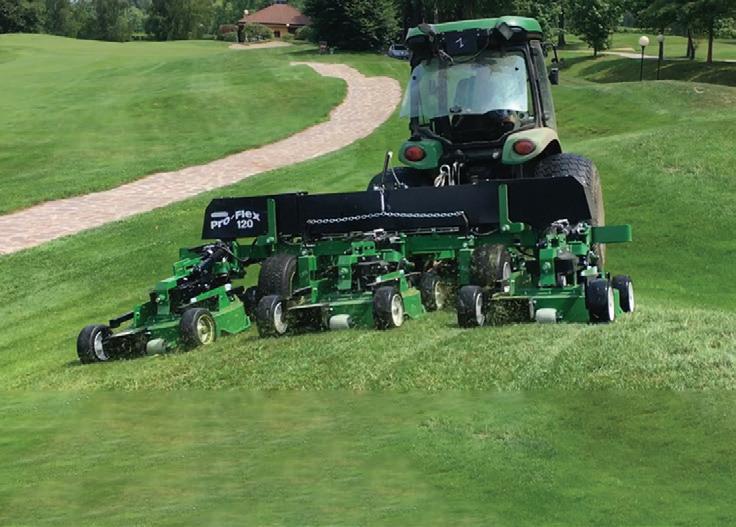

FEATURE TENNESSEE TURFGRASS FEBRUARY / MARCH 2024 Email TTA at: info@ttaonline.org 30
WWW.PROGRESSIVETURFEQUIP.COM 800.668.8873 Better Built. Quality Results. Period. Quality built in North America and supported by a world-wide Dealer network. Tri-Deck cutting widths: 12’, 15.5’, 22’*, 36’* Roller Mower cutting widths: 65”, 90”, 10.5’, 12’, 15.5’, 22’*, 29.5’* Contour/rough finishing mower: Pro-Flex™
builds the right mowers and rollers for any field. For over 30 years they have
and re-set the standards in commercial grade mowing equipment. Contact your Progressive Dealer to find out why Progressive products are outstanding in any field! * available with bolt-on galvanized deck shells
120B 10’ cut TDR-X™ roller mower 10.5’ cut Progressive Turf
set
Turf Grass Production Mowers
Contour
/ Rough Finishing Mowers
and
Sports field, Park
Estate Mowers
José Javier Vargas Almodóvar Research Associate II Turf & Ornamental Weed Science
The University of Tennessee 2431 Joe Johnson Drive
252 Ellington Plant Sci. Bldg. Knoxville, TN 37996 (865) 974-7379
jvargas@utk.edu tnturfgrassweeds.org @UTweedwhisperer
Greg Breeden
Extension Specialist, The University of Tennessee 2431 Center Drive
252 Ellington Plant Sci. Bldg. Knoxville, TN 37996-4561 (865) 974-7208
gbreeden@utk.edu tnturfgrassweeds.org
@gbreeden1
THE TURFGRASS TEAM AT THE UNIVERSITY OF TENNESSEE, KNOXVILLE
Jim Brosnan, Ph.D.
Professor, The University of Tennessee Director – UT Weed Diagnostics Center 112 Plant Biotechnology Bldg. 2505 EJ Chapman Drive. Knoxville, TN 37996
Office: (865) 974-8603
tnturfgrassweeds.org weeddiagnostics.org mobileweedmanual.com
@UTturfweeds
Kyley Dickson, Ph.D.
Associate Director, Center for Athletic Field Safety Turfgrass Management & Physiology (865) 974-6730
kdickso1@utk.edu
@DicksonTurf
Midhula Gireesh, Ph.D.
Assistant Professor and Extension Specialist
Department of Entomology and Plant Pathology
The University of Tennessee UT Soil, Plant and Pest Center 5201 Marchant Drive Nashville, TN 37211
mgireesh@utk.edu (615) 835-4571
Brandon Horvath, Ph.D.
Associate Professor, Turfgrass Science
The University of Tennessee 252 Ellington Plant Sci. Bldg. 2431 Joe Johnson Drive Knoxville, TN 37996 (865) 974-2975
bhorvath@utk.edu
turf.utk.edu
@UTturfpath
Becky Bowling, Ph.D.
Assistant Professor and Turfgrass Extension Specialist
The University of Tennessee
112 Plant Biotechnology Bldg. 2505 E.J. Chapman Dr. Knoxville, TN 37919 (865) 974-2595
Rgrubbs5@utk.edu
@TNTurfWoman
John Sorochan, Ph.D. Professor, Turfgrass Science
The University of Tennessee 2431 Joe Johnson Drive
363 Ellington Plant Sci. Bldg. Knoxville, TN 37996-4561 (865) 974-7324 sorochan@utk.edu turf.utk.edu
@sorochan
John Stier, Ph.D.
Associate Dean
The University of Tennessee 2621 Morgan Circle 126 Morgan Hall Knoxville, TN 37996-4561 (865) 974-7493
jstier1@utk.edu
turf.utk.edu
@Drjohnstier
Nar B. Ranabhat, Ph.D. Assistant Professor and Extension Plant Pathologist
Department of Entomology and Plant Pathology
University of Tennessee
UT Soil, Plant and Pest Center 5201 Marchant Drive, Nashville, TN, 37211 (615) 835-4572
nranabhat@utk.edu
@UTplantPathoDoc

TENNESSEE TURFGRASS ASSOCIATION • TENNESSEE VALLEY SPORTS FIELD MANAGEMENT ASSOCIATION • TENNESSEE GOLF COURSE SUPERINTENDENTS ASSOCIATION 31 TifTuf ® Bermuda Black Beauty Fescue HGT Bluegrass 419 Tifway Bermuda Zeon ® Zoysia Meyer Zoysia Stadium ™ Zoysia Residential Commercial Golf Courses Athletic Fields SOD & SPRIG INSTALLATION VARIETIES SELMER, TN FAYETTVILLE, TN SWEETWATER, TN 866-962-3481 CSFSOD .com MID-SOUTH’S SOURCE for QUALITY SOD and SERVICE Randall Keele Sales & Marketing Director 615-708-5219 randall@csfsod.com Morgan Yates Office Manager 423-337-0777 mkyates@live.com


















 John Clintsman
John Clintsman































































































 Fig 5: Quercus tomentella (endangered)
Fig 6: Sitka spruce
Fig 7: Solanum erianthum (potato tree), the shortest champion
Fig 5: Quercus tomentella (endangered)
Fig 6: Sitka spruce
Fig 7: Solanum erianthum (potato tree), the shortest champion















